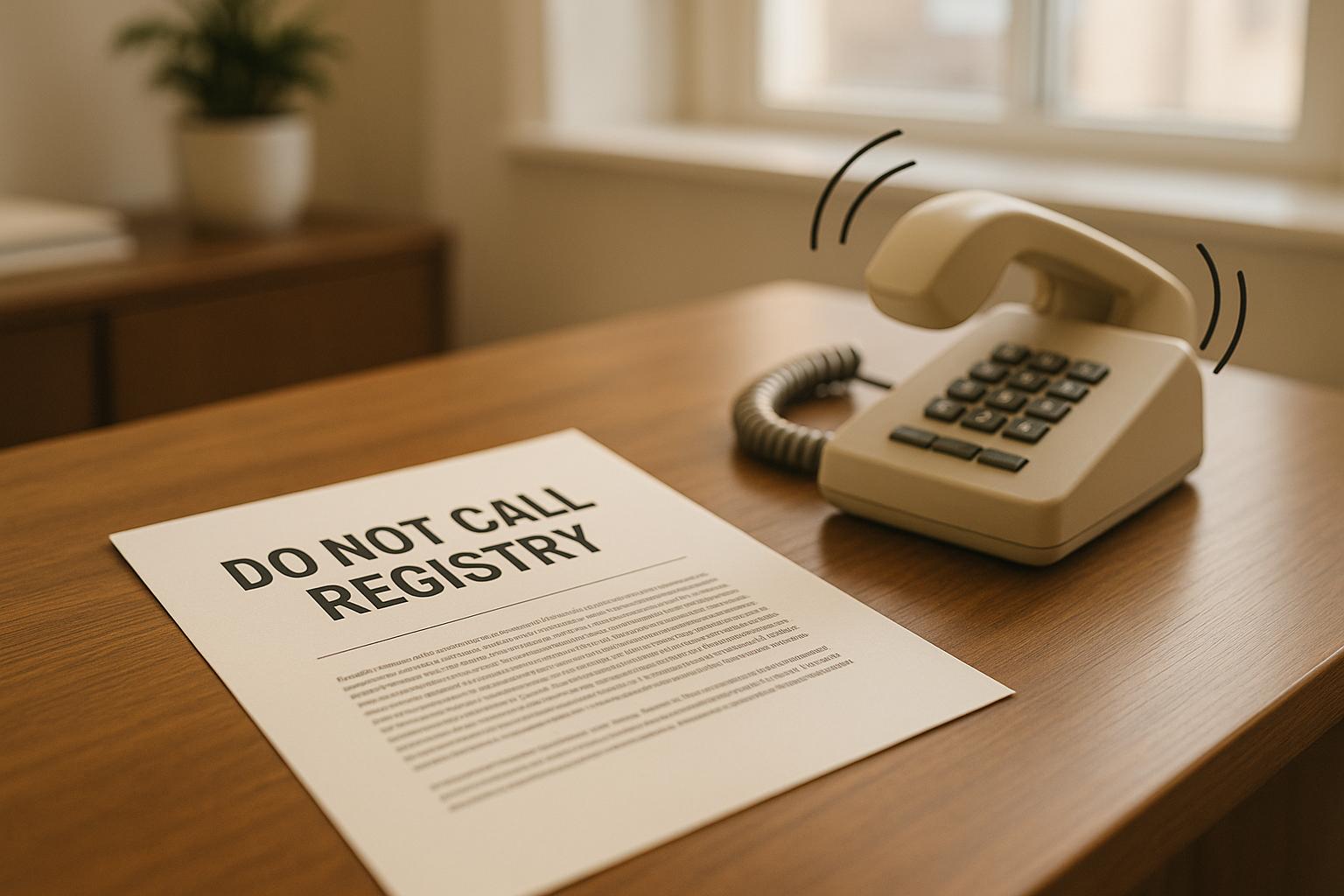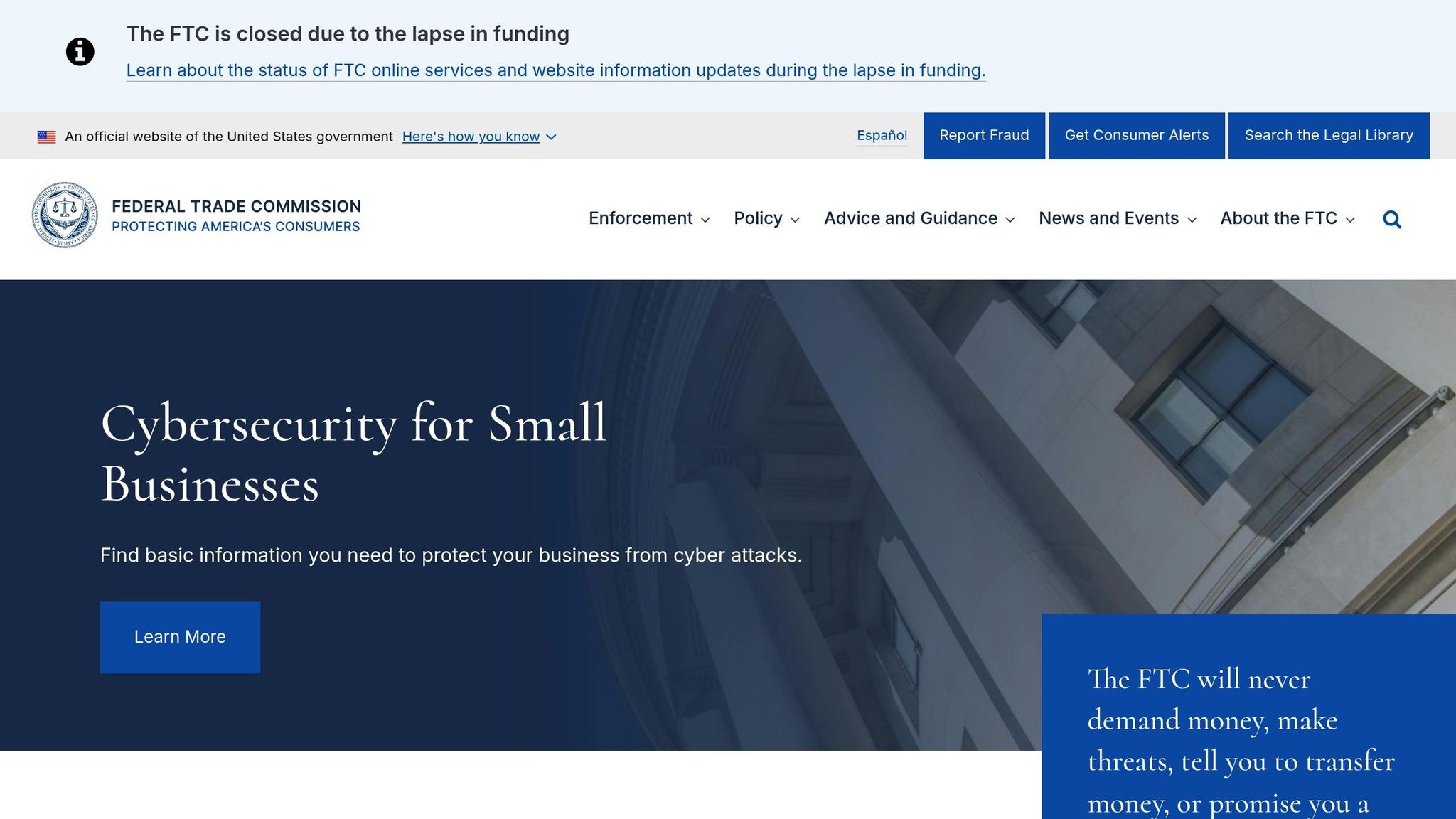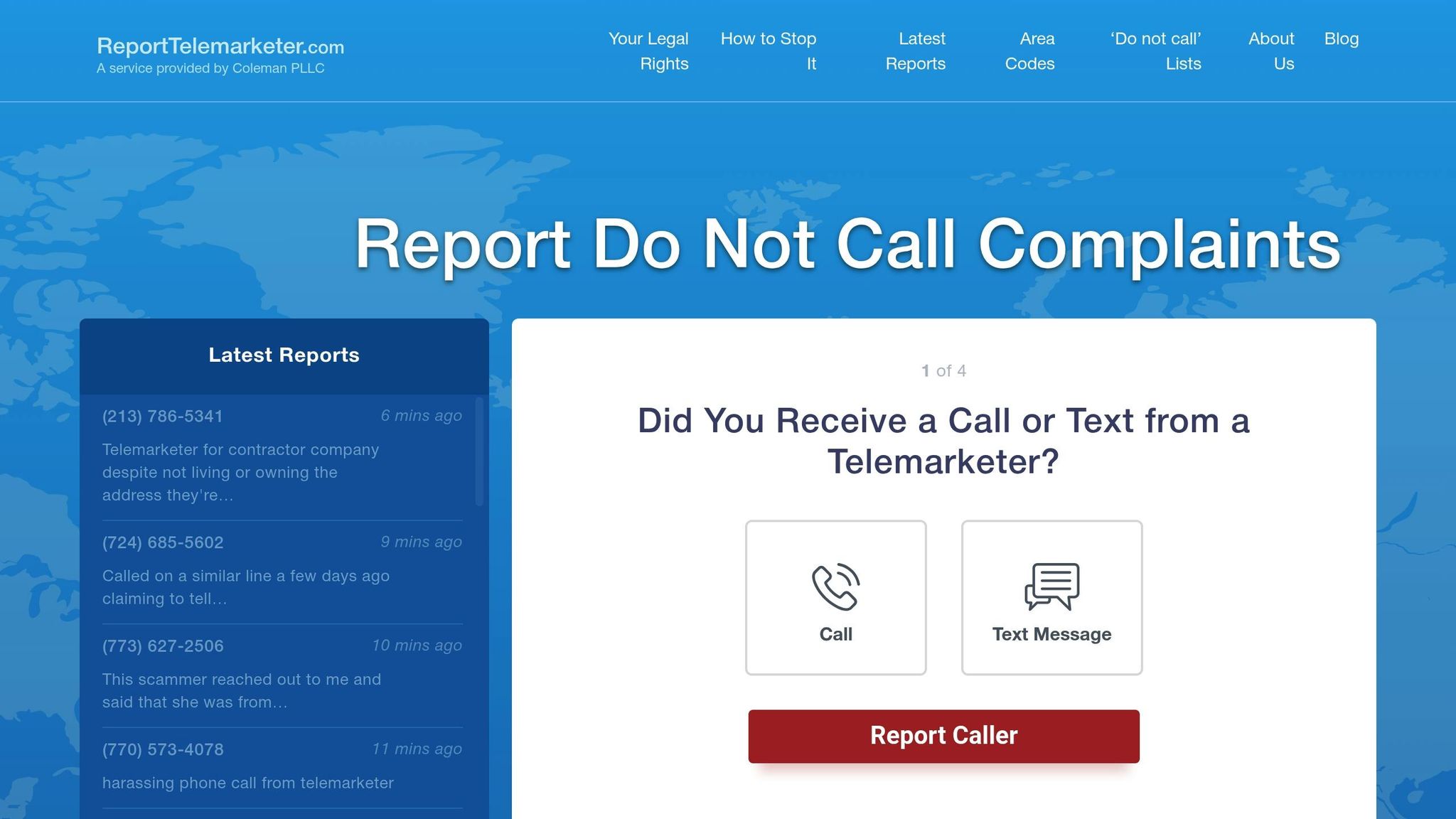
The Do Not Call Registry helps reduce unwanted telemarketing calls by allowing you to register your phone number for free. Violating these rules can lead to severe penalties for telemarketers, including:
- Federal fines: Up to $53,088 per illegal call or text.
- Private lawsuits: Consumers can sue for $500–$1,500 per violation under the TCPA.
- State penalties: Additional fines ranging from $1,000 to $25,000 per call, depending on the state.
These penalties are enforced by the FTC, FCC, and state Attorneys General. Telemarketers violating the rules can face multimillion-dollar fines, reputational damage, and even legal action from individuals or class lawsuits. Consumers can also report violations to the FTC or use services like ReportTelemarketer.com to stop calls and seek compensation.
Key Takeaways:
- Register your number on the National Do Not Call Registry for permanent protection.
- Violations can result in fines at both federal and state levels.
- Consumers can file lawsuits to recover damages for illegal calls.
- Reporting violations strengthens enforcement and helps protect your rights.
By understanding these rules, you can take action against unwanted telemarketing calls and safeguard your privacy.
What Are The Violations For Non-Compliance With The TCPA? – SecurityFirstCorp.com
Penalties for Breaking Do Not Call Rules
Telemarketers who violate Do Not Call Registry rules face hefty fines and legal consequences, both from federal agencies and private lawsuits. Over the years, penalties have increased significantly, making non-compliance a costly mistake for businesses. Here’s a closer look at how these penalties are enforced.
Federal Penalties for Violations
The Federal Trade Commission (FTC) and Federal Communications Commission (FCC) impose fines of up to $53,088 per illegal call or text as of 2025. Each violation is treated individually, meaning repeated breaches can quickly result in staggering financial penalties.
Federal enforcement doesn’t stop at fines. The FTC and FCC also investigate violations, seek civil penalties, issue injunctions, and can even revoke business licenses. Since the registry’s inception, over 150 enforcement actions have led to more than $178 million in civil penalties and $112 million in restitution to consumers. Some cases involving repeated violations – especially those targeting vulnerable individuals – have resulted in penalties exceeding $10 million. Beyond monetary fines, companies risk reputational damage and potential shutdowns through federal investigations and court orders.
Private Lawsuits and Statutory Damages
Consumers also have the right to take legal action under the Telephone Consumer Protection Act (TCPA). They can file lawsuits for statutory damages of $500 per violation – or up to $1,500 for willful breaches – without needing to prove actual harm.
Many attorneys offer these services at no upfront cost to consumers, recovering their fees directly from the telemarketer if the case is successful. This makes it easier for individuals to hold violators accountable.
Multiple Violations and Class Action Risks
Repeat offenses can snowball into overwhelming financial liabilities. Since fines are applied per illegal call or text, companies engaging in large-scale violations may face penalties that quickly escalate into millions of dollars. For instance, a campaign involving 10,000 illegal calls could result in fines exceeding $500 million.
Class action lawsuits add another layer of risk. When violations affect thousands of consumers, damages can multiply exponentially, leading to multimillion-dollar settlements or judgments. Consumer protection firms actively investigate widespread violations, pursuing both individual and class action claims.
This dual enforcement – federal penalties combined with private legal actions – creates a strong deterrent against breaking Do Not Call rules. It also underscores the registry’s critical role in protecting consumer privacy.
| Type of Penalty | Amount per Violation | Enforced By |
|---|---|---|
| Federal DNC Violation | Up to $53,088 | FTC/FCC |
| TCPA Private Lawsuit | $500 to $1,500 | Individual Consumers |
| State DNC Violation | $100 to $25,000 | State Agencies |
Even minor violations can lead to severe financial consequences for telemarketers. The escalating nature of these penalties highlights the importance of compliance with Do Not Call rules.
State Rules and Additional Penalties
Federal penalties set a baseline for telemarketing violations, but state laws add another layer of enforcement. These state-specific penalties and requirements often amplify the financial risks for violators.
State-Level Do Not Call Lists
Eleven states maintain their own Do Not Call registries in addition to the National Do Not Call Registry. These states include Colorado, Florida, Indiana, Louisiana, Massachusetts, Missouri, Oklahoma, Pennsylvania, Tennessee, Texas, and Wyoming. Each state has its own rules for registration, enforcement, and penalties.
State registries may enforce stricter rules, such as tighter call time restrictions, additional disclosure requirements, or mandatory registration fees. Telemarketers must adhere to both federal and state lists to avoid violations.
Enforcement is a key difference. While federal violations are handled by the FTC and FCC, state-specific violations fall under the jurisdiction of state Attorneys General. This dual enforcement system gives consumers more ways to report violations and hold telemarketers accountable. These state laws complement federal regulations, adding extra compliance challenges for businesses.
Different State Requirements
State penalties can vary widely. For instance:
- Pennsylvania: Civil penalties range from $1,000 per violation to $3,000 for calls targeting seniors.
- Texas: Fines can reach up to $25,000 per violation.
- Florida: Violators face penalties of up to $10,000 per call, along with additional registration fees.
These fines are in addition to federal penalties, meaning a single illegal call could result in both state and federal fines. For telemarketers operating across multiple states, the combined penalties can add up quickly, creating significant financial risks. This layered enforcement structure strengthens consumer protections across jurisdictions.
State agencies play an active role in investigating complaints. They can issue demand letters, injunctions, or even revoke telemarketing licenses. Attorneys General often secure multimillion-dollar settlements for repeat offenders, further emphasizing the seriousness of compliance failures.
Here’s a comparison of penalties:
| Jurisdiction | Penalty per Call | Special Requirements |
|---|---|---|
| Pennsylvania | $1,000–$3,000 | Higher penalties for calls targeting seniors (60+) |
| Texas | Up to $25,000 | Requires compliance with a state-specific Do Not Call list |
| Florida | Up to $10,000 | Includes additional registration fees |
| Federal (FTC) | Up to $50,120 | Nationwide enforcement |
Exemptions also vary by state. While charities, political organizations, and businesses with established relationships often have federal exemptions, state laws may interpret or limit these exemptions differently. A call that qualifies as exempt under federal law might still violate state-specific rules.
For consumers, these overlapping enforcement mechanisms mean stronger protections and more opportunities to seek compensation. Services like ReportTelemarketer.com help individuals file complaints with both federal and state agencies, boosting the chances of enforcement and potential restitution.
sbb-itb-a8d93e1
How to Report Violations and Protect Your Rights
If telemarketers are ignoring Do Not Call rules, you don’t have to just put up with it. There are steps you can take to stop those calls and even seek compensation for the inconvenience.
Filing Complaints with the FTC and State Agencies

The Federal Trade Commission (FTC) is the go-to agency for addressing illegal telemarketing calls. Filing a complaint with them is free and straightforward, but you’ll need to provide some key details. Make sure to note the caller’s phone number, the date and time of the call, and any information about the company behind it. This information helps the FTC track patterns of violations and build cases against repeat offenders.
You can submit your complaint online through the FTC’s official portal or by calling their hotline. While the FTC doesn’t resolve individual complaints, your report contributes to their efforts to crack down on widespread abuse and enforce penalties.
If your state has its own Do Not Call registry, you should also report violations to your state attorney general’s office. Some states have additional enforcement powers and might act more aggressively against violators. Keep in mind, though, that state complaints might require extra documentation, like call logs or recordings, to support your case. Also, remember that it takes up to 31 days for a new Do Not Call registration to fully take effect. If unwanted calls persist beyond that, follow up with both federal and state agencies.
For a more streamlined way to report violations, keep reading about how ReportTelemarketer.com can help.
Using ReportTelemarketer.com to Stop Telemarketing Calls

If you’re looking for a quicker, more hands-on approach, ReportTelemarketer.com might be the solution. While agencies like the FTC focus on large-scale enforcement, this service works directly on your behalf to address telemarketing violations.
ReportTelemarketer.com simplifies the reporting process and actively works to stop unwanted calls. All you need to do is fill out a form detailing the calls or texts you’ve received, and their team takes it from there. They investigate the source of the harassment and can send cease and desist letters or file formal complaints against the telemarketer.
The best part? Their service doesn’t cost you anything upfront. According to ReportTelemarketer.com, "Our services do not cost you anything out of pocket and we claim our attorney’s fees from the telemarketer after stopping the calls". They also help you pursue compensation under the Telephone Consumer Protection Act (TCPA), which allows you to recover $500 per call for violations.
By using their platform, you agree to be contacted by Coleman, PLLC, the law firm behind ReportTelemarketer.com, to discuss potential claims. Depending on the scope of the violations, they may pursue individual lawsuits or even class actions.
Getting Money Back for Telemarketing Violations
Stopping the calls is one thing, but did you know you can also get compensated for the hassle? Under the TCPA, you could recover anywhere from $500 to $1,500 per violation.
You have up to four years from the date of each violation to file a lawsuit, giving you time to document repeated offenses and build a solid case. If a single company has called you multiple times, an individual lawsuit might be your best bet. On the other hand, if a telemarketer has targeted thousands of people, a class action lawsuit may be an option.
Navigating TCPA lawsuits can get complicated, so many consumers turn to legal experts for help. Services like ReportTelemarketer.com can guide you through the process, ensuring you maximize your recovery while charging their fees to the telemarketer, not you. Keeping detailed records – like caller ID, dates, times, and any recordings – can make your case even stronger.
Don’t wait too long. Take action and consult with consumer protection attorneys to explore your options.
Protecting Yourself from Telemarketing Abuses
Taking steps to safeguard your phone number and understanding your rights is essential. Violators of telemarketing laws can face hefty fines and statutory damages, so it’s worth knowing how to protect your privacy and act when necessary.
Start by registering your number on the National Do Not Call Registry. You can do this for free through the official website or by calling the toll-free number. Once your number is registered, it becomes effective within 24 hours, though it may take up to 31 days for the full impact to kick in.
Use call-blocking tools to filter out spam or unknown numbers. Many phone carriers offer features that can identify or block robocalls before they reach you. These tools work well alongside the protections offered by the Do Not Call Registry, giving you extra peace of mind.
Beyond technology, be cautious about where you share your phone number. Avoid providing it to untrusted websites or businesses. Scammers and illegal telemarketers often obtain numbers through data breaches, online forms, or other questionable sources. If you receive unwanted calls, document them carefully – note the caller ID, date, and time. This information can be crucial if you decide to file a complaint or take legal action.
Watch for red flags during telemarketing calls. Legitimate telemarketers will identify themselves, provide clear contact details, and honor Do Not Call requests. Be suspicious of callers who pressure you to act immediately, refuse to share company information, use spoofed caller IDs, or ask for personal financial details. These are common tactics used in scams or illegal operations.
If your rights are violated, report the incident to the Federal Trade Commission (FTC) or your state attorney general as soon as possible. You can also explore services like ReportTelemarketer.com, which has already helped thousands of people stop unwanted calls without charging upfront fees.
Act quickly when violations occur. Time limits may apply to your legal rights, so don’t delay if you plan to seek statutory damages under consumer protection laws. Federal penalties for telemarketing violations are severe, and the possibility of recovering damages gives you the leverage to hold offenders accountable. By taking prompt action, you help ensure that your privacy is respected.
FAQs
What should I do if telemarketers keep calling me even though I’m on the Do Not Call Registry?
If you’re still being bothered by telemarketing calls even though you’ve registered your number on the Do Not Call Registry, you don’t have to just put up with it. You have options to address the issue and hold these telemarketers accountable.
There are services available that can help you track down violations, put an end to the calls, and even take legal steps like sending cease and desist letters or filing formal complaints. The good news? Many of these services are free for consumers, as any costs are often recovered directly from the telemarketers themselves.
How can I prove a telemarketer violated the Do Not Call rules and take action?
To show that a telemarketer broke the Do Not Call rules, start by gathering essential evidence. Write down the date and time of the call, the phone number that contacted you, and any details about the conversation or voicemail. If the calls happen repeatedly or follow a pattern, make sure to document that as well – this can help build a stronger case.
Not sure what to do next? Services like ReportTelemarketer.com can help. They can investigate the telemarketer, check if they had proper consent to contact you, and even take actions like sending cease-and-desist letters or filing formal complaints. With solid evidence, you can take steps to hold violators accountable and put an end to those unwanted calls.
Are telemarketers ever allowed to call numbers on the Do Not Call Registry?
Telemarketers do have some exceptions that allow them to legally call numbers listed on the Do Not Call Registry. For instance, calls from political organizations, charities, and surveyors are typically permitted. Moreover, businesses can contact you if there’s an existing relationship or if you’ve provided prior written consent.
If you suspect a telemarketer has broken the rules, you can report the unwanted call. Consumer protection services are available to help investigate and address such violations, potentially putting an end to the disruptive calls.